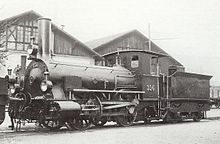locomotive
Hello, you have come here looking for the meaning of the word locomotive. In DICTIOUS you will not only get to know all the dictionary meanings for the word locomotive, but we will also tell you about its etymology, its characteristics and you will know how to say locomotive in singular and plural. Everything you need to know about the word locomotive you have here. The definition of the word locomotive will help you to be more precise and correct when speaking or writing your texts. Knowing the definition oflocomotive, as well as those of other words, enriches your vocabulary and provides you with more and better linguistic resources.

A steam locomotive.
English

Etymology
From French locomotif, from Latin locō (literally “from a place”) (ablative of locus (“place”)) + Vulgar Latin mōtivus (“moving”) (see motive).
In the rail transport sense, ellipsis of locomotive (steam) engine, attested from 1814.[1]
Pronunciation
- (General American) IPA(key): /ˌloʊkəˈmoʊtɪv/
- (Received Pronunciation) IPA(key): /ˌləʊkəˈməʊtɪv/
Audio (US): (file)
Noun
locomotive (plural locomotives)
- (rail transport) The power unit of a train that pulls the coaches or wagons.
- Hypernym: rolling stock
- 1953 February, “British Railways Standard Class "4" 2-6-0 Locomotives”, in Railway Magazine, page 109:
- As on all other British Railways standard locomotives to date, the lubrication of motion pins and reversing gear is by grease nipple and gun.
- (rare) A traction engine.
- (slang) A cheer characterized by a slow beginning and a progressive increase in speed.
- (archaic) Any of various early road vehicles, steam-powered, etc., forerunners of the modern car.
- (economics) A country which drives the world economy by having a high level of imports, such as the United States.
Synonyms
Derived terms
Translations
self-propelled vehicle that runs on rails
|
Adjective
locomotive (comparative more locomotive, superlative most locomotive)
- Of or relating to locomotion.
- Of or relating to the power unit of a train which does not carry passengers or freight itself.
- Moving, or capable of motion.
Translations
relating to locomotion
|
moving — see moving
References
- ^ Douglas Harper (2001–2024) “locomotive”, in Online Etymology Dictionary.
French
Pronunciation
Adjective
locomotive
Noun
locomotive f (plural locomotives)
Derived terms
Further reading
- “locomotive”, in Trésor de la langue française informatisé , 2012.
Italian
Noun
locomotive f
- plural of locomotiva